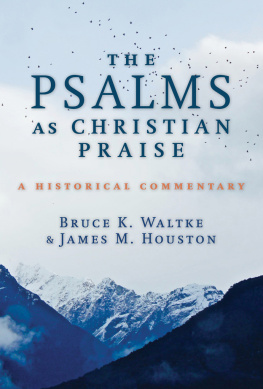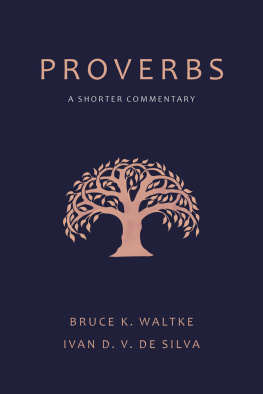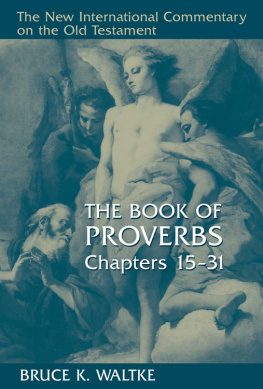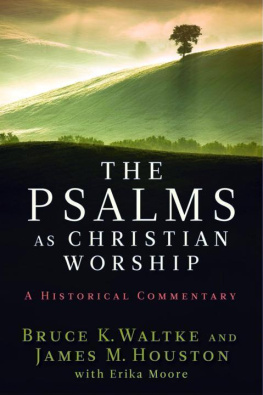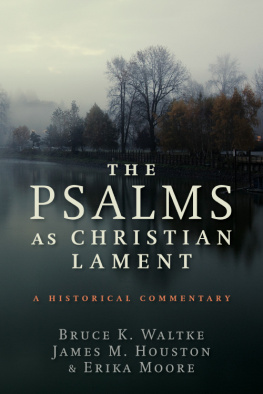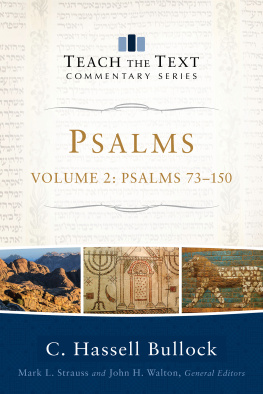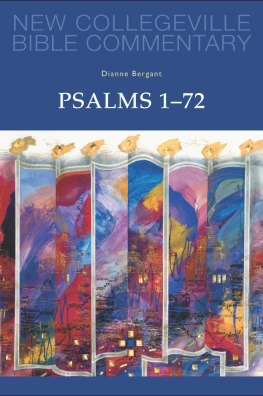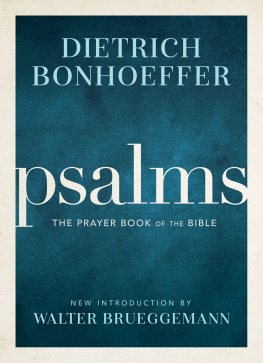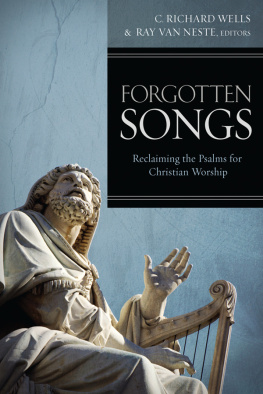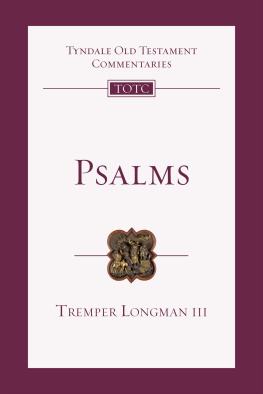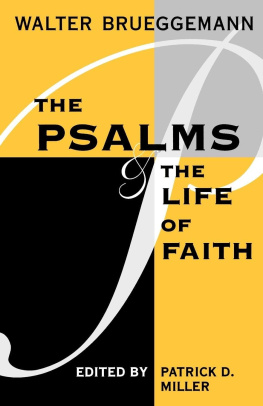The Psalms as Christian Praise
A Historical Commentary
Bruce K. Waltke and James M. Houston
WILLIAM B. EERDMANS PUBLISHING COMPANY
GRAND RAPIDS, MICHIGAN
Wm. B. Eerdmans Publishing Co.
4035 Park East Court SE, Grand Rapids, Michigan 49546
www.eerdmans.com
2019 Bruce K. Waltke and James M. Houston
All rights reserved
Published 2019
252423222120191234567
ISBN 978-0-8028-7702-4
eISBN 978-1-4674-5742-2
Library of Congress Cataloging-in-Publication Data
Names: Waltke, Bruce K., author.
Title: The Psalms as Christian praise : a historical commentary / Bruce K. Waltke and James M. Houston.
Description: Grand Rapids : Eerdmans Publishing Co., 2019. | Includes bibliographical references and index. |
Summary: Completes a trilogy of exegetical volumes on the Psalms, following up on The Psalms as Christian Worship and The Psalms as Christian Lament. Examines twelve praise psalms, each including a translation, commentary, and how the psalm was interpreted in the Christian tradition. Intended especially for preachers and students of PsalmsProvided by publisher.
Identifiers: LCCN 2019022635 | ISBN 9780802877024 (trade paperback)
Subjects: LCSH: PraiseBiblical teaching. | Bible. PsalmsCriticism, interpretation, etc.
Classification: LCC BS1199.P67 W38 2019 | DDC 223/.206dc23
LC record available at https://lccn.loc.gov/2019022635
CONTENTS
The Psalms are part of the hymnbook of the Lord Jesus Christ. As a child, brought up in a Jewish home, he recited and learned the Book of Psalms. But as an adult, he uniquely makes the sevenfold claim I AM which is recorded in Johns gospel. His use of I AM for himself makes him the object of praise in the Psalms for Christians. So with reference to Christ, Christians read the psalms in two ways. They join him as the son of David in petitioning and praising God, and they petition and praise him as the Son of God.
In our first commentary, we focused on Christian worship, then in our second commentary on Christian lament, and now, thirdly, we are exploring the depths of Christian praise. The most profound level of praise is that creation itself was brought into being to give praise to the Creator. Anyone familiar with art and engineering marvels at the Creator of heavens and earth. More than that, the Creator brought the earth-disc into existence by triumphing over the inexplicable chaotic abyss, and gave it to humankind as a breathtaking gift, a place to live and have their being. The creation of the earth-disc was the first of I AMs many saving acts. He created humankind to reflect upon his triumph and his gift to them, and to praise him.
Like a temple built for worship and praise, the earth-disc is an amphitheater for praise. And the earth-disc is the stage in unfathomable space where God through Christ and his church triumphs over Satan, sin, and death, and so gives meaning to humankinds existence. God gave his people the voice of the psalmist as a vehicle to express their praise of him as Creator and Lord of history.
Praise is the essence of the Psalter, but since so many psalms are entirely songs of praise, we have mostly narrowed the focus to a subspecies of praise psalms: those that proclaim I AM reigns. This proclamation is heard in Psalms 47:8[9] (God reigns); 93:1; 96:10; 97:1; and 99:1. Aside from Psalm 47, that proclamation is heard in the context of Book IV of the Psalter (Psalms 90106). The theme of Gods kingship is clearly heard also in other psalms of Book IV. The theme is picked up in the climax of Psalm 103:19: I AM has set up his throne in heaven, and his kingdom rules over the whole [universe]. The most famous psalm acclaiming him as Creator is the exquisite Psalm 104, and Psalm 103 is one of the most cherished psalms that praise him as Savior. So our focus is on Book IV of the Psalter (Psalms 90106); namely, Psalms 90100aside from the lament Psalm 94and Psalms 103104.
Before hearing the inspired Voice of the Psalmist and the believing Voice of the Church in response, we introduce the selected corpus by reflecting on praise, attempting to answer such as questions as Why praise God? and How to praise him? In light of his untarnished holiness, we are deeply conscious of our unclean lips, yet fully persuaded that the death of Christ and purging Spirit are the double cure to save from wrath and make us pure.
Our aim in all three commentaries on the Psalms is to edify the Church by hearing both the Voice of the Psalmist through the careful exegesis of the selected corpus and by hearing the Voice of the Church in response. By edify we mean to add substance to faith, ardor to virtue, conviction to confession; and that the Church be nerved to fidelity, especially in this time of persecution in many parts of the world and of apostasy in the West.
We introduced ourselves in the Prologue to The Psalms as Christian Worship. Bruce Waltke (Professor Emeritus of Biblical Studies, Regent College) contributes The Voice of the Psalmist and the Conclusions. James Houston (Professor Emeritus of Spiritual Theology, Regent College) contributes The Voice of the Church in Response. In the first two volumes we first presented the Voice of the Church and then the Voice of the Psalmist. We did so because in the history of interpretation Bruces exegesis is informed by the latest advances in biblical hermeneutics. Here we reversed the order to a more natural chronological sequence, hearing first the inspired Voice of the Psalmist and then the believing Voice of the Church in response. For a fuller understanding of these two voices, see the Prologue to The Psalms as Christian Worship.
We thank Eerdmans Publishing for giving us a voice, and we are especially grateful to Samuel Kelly and Andrew Knapp for their superb editing to help us speak more clearly.

. David M. Howard, Jr., The Structure of Psalms 93100, BJSUCSD 5 (Winona Lake, IN: Eisenbrauns, 1997), 176.
In the Preface we explain why we selected the psalms in Book IV of the Psalter to hear the voices of the inspired psalmist and of the church in response. To help us introduce this corpus, we rather flippantly employ Rudyard Kiplings six honest serving-men: I keep six honest serving-men/ (They taught me all I knew);/ Their names are What and Why and When/ And How and Where and Who.
The Psalter petitions and praises Israels living God, YHWHtraditionally the LORD and in this volume rendered I AM. Psalm 99 has I AM as its first and last word, the alpha and the omega. Gods name occurs seven times in that psalm, and independent pronouns (not required in Hebrew) for I AM also occur seven times. In Scripture, the number seven symbolizes divine attributes and works (cf. Josh. 6:4).
A. Reflections on the Progressive Revelation of God
God progressively reveals himself to Israel, his adopted family, today identified as the church. When God called Moses to lead his people out of Egypt to the land that he promised the patriarchs, he patiently revealed his name. Names in the Bible commonly involve wordplay (association of a proper name with a similar-sounding word). Wordplay in the Pentateuch, according to Austin Surls, has four possible functions: commemoration (e.g. Cain, Gen. 4:1), anticipation (e.g., Noah, Gen. 5:29), description (e.g., Eve, Gen. 3:20) and renaming (e.g., Abraham, Gen. 17:5). Her interpretation partially supports the traditional meaning I AM WHO I AM. Thus his name speaks of his eternal, unchanging Being. Israels God is an aseity; he is not a derivative of someone or something.

